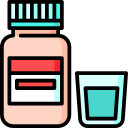
Napryn
Form: Powder for Suspension
Strength: 125mg/5ml
Generic Name: Naproxen
Company: Healthcare Pharmaceuticals Ltd.
MRP:৳ 90.0 (50ml bot)
Is Antibiotic: No
Indications
Napryn is used to relieve the signs and symptoms of rheumatoid arthritis, osteoarthritis, ankylosing spondylitis, juvenile arthritis, tendonitis, bursitis, and acute gout. Napryn is also helpful in treating primary dysmenorrhea and pain.
Pharmacology
Like other non-selective NSAIDs, Napryn works by blocking the COX-1 and COX-2 enzymes, which reduces prostaglandin production. While COX-1 enzymes are always active and found in normal tissues like the stomach lining, COX-2 enzymes are activated during pain, fever, and inflammation. The COX-2 enzyme helps with the pain-relieving and anti-inflammatory effects, while the COX-1 enzyme is linked to side effects such as stomach problems and kidney damage.
Dosage & Administration
Oral Tablets (Enteric Coated): Adults should take 500-1000 mg per day in two divided doses at 12-hour intervals. For acute gout, start with 750 mg, then take 250 mg every 8 hours. For pain and muscle problems, the starting dose is 500 mg, followed by 250 mg every 6-8 hours if needed. Do not exceed 1000 mg per day. Children under 16 years should not use this product.
Suspension (for Children): For juvenile rheumatoid arthritis, children over 2 years should take 10 mg/kg/day in two doses at 12-hour intervals. For example, children weighing 13 kg (29 lb) should take 2.5 mL twice a day. Children under 2 years should not use this product.
Topical Gel: Apply 2-6 times a day as needed. Not recommended for use in children.
Interaction
Avoid using Napryn with ACE inhibitors as Napryn can reduce their blood pressure-lowering effect. Antacids and sucralfate delay its absorption. Taking Napryn with aspirin may increase side effects. Napryn can reduce the effectiveness of diuretics and increase the risk of bleeding with blood thinners like warfarin. Using Napryn with methotrexate or SSRIs may also increase the risk of side effects.
Contraindications
Napryn should not be used in people who are allergic to Napryn, or those who have had asthma, urticaria, or allergic reactions to aspirin or other NSAIDs. Napryn is also not recommended for use after coronary artery bypass surgery (CABG).
Side Effects
Common side effects include heartburn, stomach pain, nausea, diarrhea, and indigestion. Some people may experience headaches, dizziness, or drowsiness. Skin reactions like itching and purple spots can occur. Napryn may also cause swelling, palpitations, or issues with vision and hearing.
Pregnancy & Lactation
Napryn can cause issues for the fetus, such as premature closure of a blood vessel. Napryn should only be used during pregnancy if absolutely necessary and after carefully considering the risks to the baby. Small amounts are excreted in breast milk, and Napryn is usually considered safe during breastfeeding, but some manufacturers recommend avoiding breastfeeding during treatment.
Precautions & Warnings
Napryn may cause kidney problems in some people, especially with long-term use. Use with caution in patients with kidney issues. Liver damage, though rare, has also been reported. If there is any sign of kidney or liver problems, the use of this product should be reconsidered.
Overdose Effects
Information on overdose is not available.
Therapeutic Class
Napryn is a non-steroidal anti-inflammatory drug (NSAID) used for osteoarthritis, rheumatoid arthritis, and other inflammatory conditions.
Storage Conditions
Store below 30°C, away from light and moisture, and keep out of the reach of children.
Similar Brands of Naproxen (Powder for Suspension – 125mg/5ml)
| Brand Name | Form | Strength | Company | MRP (৳) |
|---|---|---|---|---|
| Diproxen | Powder for Suspension | 125mg/5ml | Drug International Ltd. | 70.0 |
| Naprosyn | Powder for Suspension | 125mg/5ml | Radiant Pharmaceuticals Ltd. | 130.0 |
| Naprox | Powder for Suspension | 125mg/5ml | Eskayef Pharmaceuticals Ltd. | 90.0 |
| Nuprafen | Powder for Suspension | 125mg/5ml | Beximco Pharmaceuticals Ltd. | 70.0 |